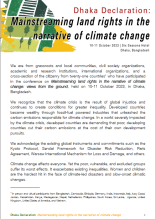Land Library Search
Through our robust search engine, you can search for any item of the over 73,000 highly curated resources in the Land Library.
If you would like to find an overview of what is possible, feel free to peruse the Search Guide.
/ library resources
Showing items 10 through 18 of 2958.L'Afrique est confrontée à une crise alimentaire d'une ampleur sans précédent.
Land corruption – corrupt practices in the land sector – threatens the lives and livelihoods of people and communities, the environment and climate, food security and political stability. Its impacts are particularly acute for 2.5 billion people who live on and from the land.
Sierra Leone is endowed with abundant of natural resource wealth including Diamond, Gold, and Rutile, Iron Ore, large marine resources and stretches of arable land.
Questions about how land is governed and controlled in the context of multiple crises are key to debates about fair transitions. The energy transition, net-zero ambitions, nature protection, and food system transformation all involve claims on land, water, and forests.
Los Pueblos Indígenas son mencionados solamente en 2 de las 169 metas de los 17 Objetivos de Desarrollo Sostenible (ODS). Cada objetivo proporciona metas específicas que deben alcanzarse a lo largo de un período de 15 años.
We, the African Heads of State and Government, gathered for the inaugural Africa Climate Summit (ACS) in Nairobi, Kenya, from 4th to 6th September 2023; in the presence of other global leaders, intergovernmental organizations, Regional Economic Communities, United Nations Agencies, private sector
This document includes recommendations to different stakeholder groups (from governments to UN organizations) to operationalize a human rights-based approach to climate justice that affirms the link between climate action and land tenure security of the rural poor.
This case study describes the work of the Maliasili / Maasai Landscape Conservation Fund (MLCF).
While emissions trading already began in the late 1980s and early 1990s, carbon markets can officially be traced back to the Kyoto Protocol of 1997.









